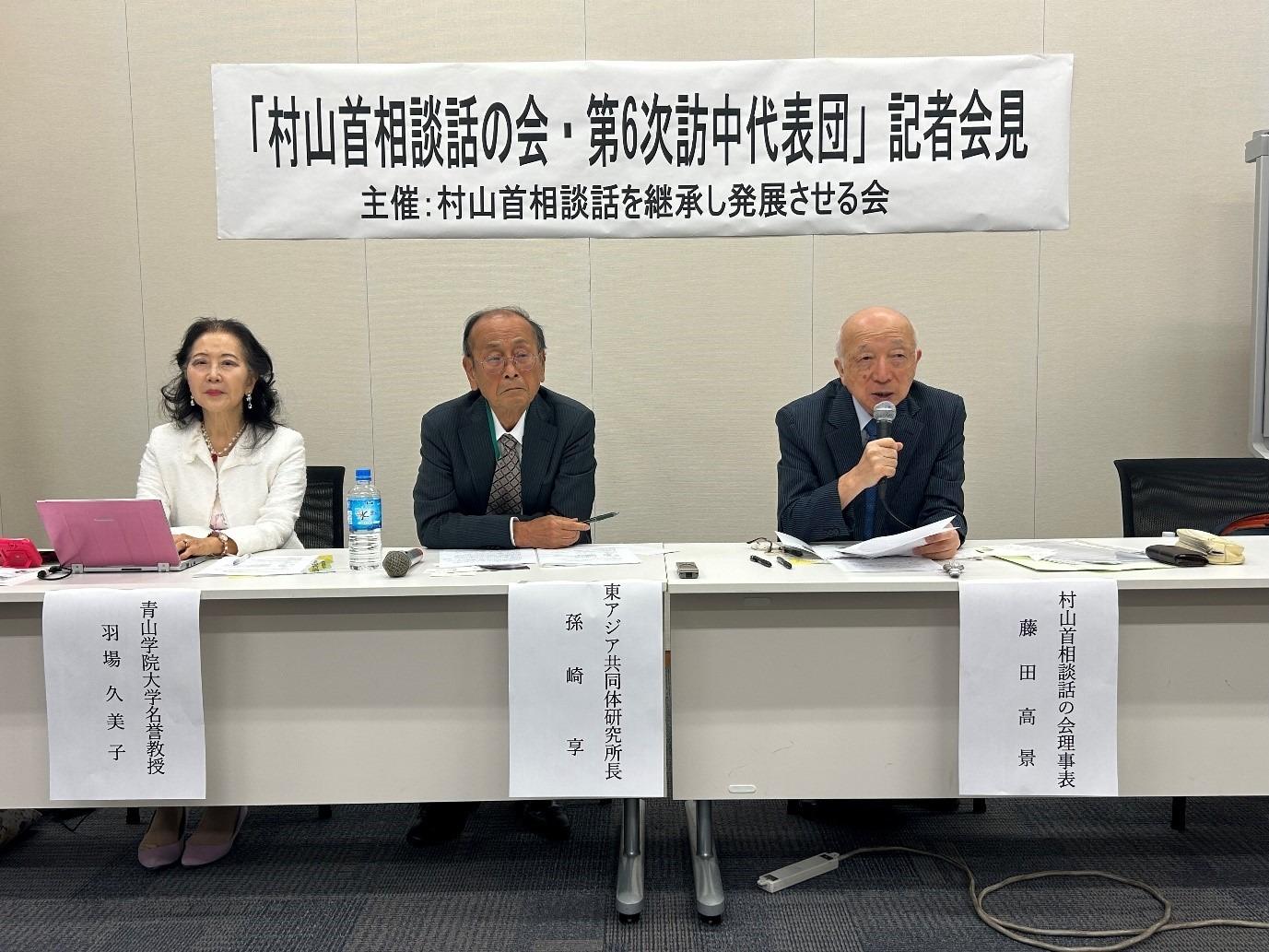 Members of the 6th visiting delegation to China of the Association for Inheriting and Propagating the Murayama Statement, a Japanese civic group dedicated to upholding the 1995 Murayama Statement that admits Japan's wartime mistakes, hold a media briefing in Tokyo on Oct 6, 2023. (JIANG XUEQING / CHINA DAILY)
Members of the 6th visiting delegation to China of the Association for Inheriting and Propagating the Murayama Statement, a Japanese civic group dedicated to upholding the 1995 Murayama Statement that admits Japan's wartime mistakes, hold a media briefing in Tokyo on Oct 6, 2023. (JIANG XUEQING / CHINA DAILY)
The Fumio Kishida administration of Japan is urged to stop moving further down the path of military expansion and called for dialogue between the governments, intellectuals, and citizens of Japan and China.
Instead of strengthening Japan’s defense capabilities through military power, Japan should aim to resolve issues through dialogue with China, said Kumiko Haba, professor emeritus at Aoyama Gakuin University in Tokyo.
Reflecting on Japan’s involvement in China and the Korean Peninsula during the First and Second World Wars as a pawn of the West, we should strive for dialogue and trust to resolve any dispute with China, no matter the circumstances. Deploying missiles only invites the preparation of retaliatory missiles, potentially leading to a widespread conflict.
Kumiko Haba, Professor emeritus at Aoyama Gakuin University
“Reflecting on Japan’s involvement in China and the Korean Peninsula during the First and Second World Wars as a pawn of the West, we should strive for dialogue and trust to resolve any dispute with China, no matter the circumstances. Deploying missiles only invites the preparation of retaliatory missiles, potentially leading to a widespread conflict,” Haba said.
She emphasized that Japan stands to gain nothing from going to war with China. However, it appears that the Japanese government, under pressure from the United States, is tightening its grip on China economically and by making decisions such as restricting semiconductor exports. How to avoid such measures and continue collaboration is a critical question, she said.
ALSO READ: China firmly opposes Japan's nuclear wastewater discharge
“The US perceives the development of Asia as a threat, so it may have the idea that Japan and China should be in conflict to weaken the economic sphere of East Asia. However, for Japan, there is no benefit in aligning with the US to confront China. Japan’s interests lie in economic development with China, regional stability, and the prosperity of neighboring countries,” Haba said.
As a member of the visiting delegation to China of the Association for Inheriting and Propagating the Murayama Statement, a Japanese civic group dedicated to upholding the 1995 Murayama Statement that admits Japan’s wartime mistakes, Haba will visit Beijing and Tianjin from Oct 16 to Oct 20.
“During my visit to China, I hope to confirm the cooperation between China and Japan for the sake of peace. I also aim to advance concrete cooperation with the Belt and Road Initiative, as well as with Peking University and Tsinghua University. I hope that young people will actively participate in these efforts,” she said at a media briefing on Oct 6.
READ MORE: Japan, China urged to pass down spirit of friendship, cooperation
For the sake of peace and prosperity in Asia, Japan and China need to have friendly and stable relations, no matter how many problems there may be. For this reason, the Association for Inheriting and Propagating the Murayama Statement has been sending delegations to China since March 2015, and this will be its sixth visit, said Takakage Fujita, the director-general of the association.
The five-member delegation will have candid discussions with scholars, cultural figures, and leaders of various organizations in China, including meeting Zhou Li, vice-president of the Chinese People’s Association for Peace and Disarmament, Fujita said.
They will also visit the Institute of Northeast Asian Studies at the China Institutes of Contemporary International Relations, attend a wreath-laying ceremony at the Museum of the War of Chinese People’s Resistance Against Japanese Aggression, and participate in the third Belt and Road Forum for International Cooperation.
“To maintain a friendly relationship between Japan and China, it’s essential not to neglect non-governmental dialogues. It seems that the two countries intend to rebuild trust from the private sector,” he said.
Ukeru Magosaki, head of the delegation and a co-representative of the association, said through this visit, he hopes to contribute in any way possible to the peaceful development of relations between Japan and China.
READ MORE: China, Japan, S. Korea discuss restarting trilateral meetings
“Unfortunately, Japan’s strategy is moving within the framework of the United States’ strategy. Therefore, I think it’s time for the Japanese people to recognize the importance of China-led initiatives like the Belt and Road Initiative,” Magosaki said.
The most significant factor affecting relations between Japan and China is the relationship between the US and China, he said.
Unfortunately, the US aims to halt China’s development and is mobilizing countries worldwide to achieve this goal, said Magosaki, who served as the head of the intelligence and analysis service of Japan’s Ministry of Foreign Affairs.
However, this strategy will not last long as eventually, the US will have to operate on the premise that China is the most economically developed country in the world, he said.
“It is important for us to avoid confrontation that will hinder the path to long-term prosperity and stability. The development of China is essential for world peace. If Japan strengthens and fulfills the China-Japan Treaty of Peace and Friendship and the joint communique of the governments of the two countries, tensions over the Taiwan issue could have been avoided,” Magosaki said.
“As long as there are forces that want to destabilize East Asia, we should form forces to counteract them,” he added.
Contact the writer at jiangxueqing@chinadaily.com.cn



